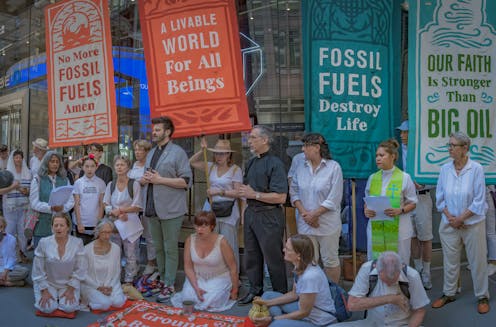Research shows that a majority of Christian religious leaders accept the reality of climate change but have never mentioned it to their congregations
- Written by Stylianos Syropoulos, Assistant Professor of Psychology, Arizona State University

Nearly 90% of U.S. Christian religious leaders believe humans are driving climate change. When churchgoers learn how widespread this belief is, they report taking steps to reduce its effects, as we found in our research published in the Proceedings of the National Academy of Sciences[1].
We examined data collected in 2023 and 2024 from a nationwide survey of 1,600 religious leaders in the United States[2]. The sample included religious leaders from fundamentalist and evangelical churches, Baptists, Methodists, Black protestants, Roman Catholic denominations and more – all recruited to match the proportions of churches across the country. The survey assessed religious leaders’ beliefs about climate change and whether they discuss climate change with their congregations.
According to that data, while the overwhelming majority of Christian religious leaders accept the human-driven reality of climate change, nearly half have never mentioned climate change or humans’ role in it to their congregations. Further, only a quarter have spoken about it more than once or twice.
Why it matters
When it comes to climate change, faith communities are often seen as divided[3]. There is an assumption that religious conservatism and climate skepticism go hand in hand[4]. This assumption is based on religious beliefs such as that the Earth was created by God and therefore humans cannot and should not alter it, along with rejection of climate science and diminished concern about climate change.
We then surveyed a sample of Christian Americans from major denominations across the country and found they think roughly half of Christian leaders in the U.S., and in churches like their own, deny that humans cause climate change. Given the actual number is closer to 1 in 10 based on the data we examined, it appears Christians overestimate the prevalence of climate denial among their leaders by around five times the level found in polling.
Churchgoers who think their religious leaders don’t believe humans cause climate change report being less likely to discuss it with fellow congregants and less interested in attending events that aim to address climate change or raise awareness of the issue.
The research also tested what would happen if we informed churchgoers of the true level of consensus among their religious leaders who accept that climate change is driven by humans. In a brief survey, Christians were told the percentage of Christian leaders nationally, and among their denomination specifically, who accepted that human activities cause climate change. As a result, we found, their perceptions and attitudes toward climate change shifted in a variety of ways.
Specifically, churchgoers who were informed about the actual consensus among religious leaders in accepting climate change were more likely to state that “taking action to reduce climate change” was consistent with their church’s values.
Churchgoers who received this information were also more likely to feel it would be inconsistent with their church’s values to vote for a political candidate who opposes actions that could slow climate change.
These findings highlight that religious leaders have a unique power to influence climate action – but only if they let their beliefs be known.
What’s next
These findings are not focusing on what is going on in specific churches and denominations. We provided churchgoers only with information on the consensus of acceptance of human-made climate change among Christian religious leaders across the U.S. A natural next step is to conduct research with religious leaders to examine the impact of their communication directly with their congregations, including if they convey the consensus described in this work.
Religious leaders, often viewed as moral guides[6], have the ability to reshape climate discourse within faith communities. If they vocalize their acceptance of human-made climate change, we believe they can correct widespread misperceptions, foster dialogue and encourage action in ways that secular authorities may struggle to achieve.
The Research Brief[7] is a short take on interesting academic work.
References
- ^ published in the Proceedings of the National Academy of Sciences (doi.org)
- ^ nationwide survey of 1,600 religious leaders in the United States (www.nationalsurveyreligiousleaders.org)
- ^ faith communities are often seen as divided (www.pewresearch.org)
- ^ climate skepticism go hand in hand (doi.org)
- ^ Mascot/Digital Vision via Getty Images (www.gettyimages.ch)
- ^ Religious leaders, often viewed as moral guides (doi.org)
- ^ Research Brief (theconversation.com)
Authors: Stylianos Syropoulos, Assistant Professor of Psychology, Arizona State University



